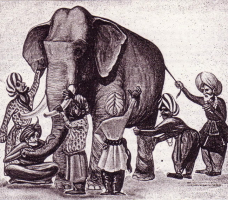January 28, 2017
Future of CRE + Workplace trends lists + Business leaders bad at managing people 0
 In this week’s Newsletter; from the latest issue of Work&Place which is out now, Antony Slumbers discusses the impact of technology on corporate real estate. Mark Eltringham presents the top five songs about office life and office furniture; and explains how the numskulls show why we need a better understanding of how people respond to their surroundings. We have a trawl through the annual list of workplace trends that appear this time of year; learn that flexible working hours help make the UK’s self-employed much happier than those in traditional employment; and discover why physical workspaces need to be designed to support the digital workplace. Two new reports reveal a shortfall in people management skills among current and future leaders; and why Barcelona’s iconic Agbar Tower is being deserted by its unhappy occupants. Download our Briefing, produced in partnership with Boss Design on the link between culture and workplace strategy and design; visit our new events page, follow us on Twitter and join our LinkedIn Group to discuss these and other stories.
In this week’s Newsletter; from the latest issue of Work&Place which is out now, Antony Slumbers discusses the impact of technology on corporate real estate. Mark Eltringham presents the top five songs about office life and office furniture; and explains how the numskulls show why we need a better understanding of how people respond to their surroundings. We have a trawl through the annual list of workplace trends that appear this time of year; learn that flexible working hours help make the UK’s self-employed much happier than those in traditional employment; and discover why physical workspaces need to be designed to support the digital workplace. Two new reports reveal a shortfall in people management skills among current and future leaders; and why Barcelona’s iconic Agbar Tower is being deserted by its unhappy occupants. Download our Briefing, produced in partnership with Boss Design on the link between culture and workplace strategy and design; visit our new events page, follow us on Twitter and join our LinkedIn Group to discuss these and other stories.

















 According to new research from the Chartered Institute of Personnel and Development, the number of people saying that they have experienced mental health issues while in employment has climbed from a quarter to a third over the last five years. Despite this, the majority of employees still don’t feel that people experiencing mental health issues are supported well enough at work. In response, the CIPD is calling on organisations to take a more preventative approach to employees’ mental wellbeing, encouraging a culture of openness in their workplace, whilst at the same time, training line managers to provide and signpost support for employees, in order to create healthier, more engaged and more productive workplaces. The new research from the CIPD claims that in 2016, almost a third (31 percent) of the over 2,000 employees surveyed said they have experienced a mental health problem at some point during their working life, compared with a quarter (26 percent) in 2011.
According to new research from the Chartered Institute of Personnel and Development, the number of people saying that they have experienced mental health issues while in employment has climbed from a quarter to a third over the last five years. Despite this, the majority of employees still don’t feel that people experiencing mental health issues are supported well enough at work. In response, the CIPD is calling on organisations to take a more preventative approach to employees’ mental wellbeing, encouraging a culture of openness in their workplace, whilst at the same time, training line managers to provide and signpost support for employees, in order to create healthier, more engaged and more productive workplaces. The new research from the CIPD claims that in 2016, almost a third (31 percent) of the over 2,000 employees surveyed said they have experienced a mental health problem at some point during their working life, compared with a quarter (26 percent) in 2011.
 In America at least, the great symbol of corporate conformity is the office cubicle. Satirised in the Dilbert cartoons and a staple in any movie about the degrading aspects of modern working life, the cubicle provides a perfect shorthand way of portraying an individual crushed by the corporate jackboot. Yet what these things miss is the propensity of people to personalise their surroundings and claim a space as their own, even if only for the short time they may be there. This seems to be particularly the case when it comes to office design and so we were much taken with
In America at least, the great symbol of corporate conformity is the office cubicle. Satirised in the Dilbert cartoons and a staple in any movie about the degrading aspects of modern working life, the cubicle provides a perfect shorthand way of portraying an individual crushed by the corporate jackboot. Yet what these things miss is the propensity of people to personalise their surroundings and claim a space as their own, even if only for the short time they may be there. This seems to be particularly the case when it comes to office design and so we were much taken with 
 Office politics is the one thing many young people are least prepared for when starting their first job, according to a new study by the Co-op. The study comes as many them are about to enter the workforce for the first time. With more young people opting for the world of work in the form of apprenticeships and on the job training rather than higher education, the members of ‘Generation Y’ often find they are unprepared for these softer skills needed to get on in the office according to the poll of 1,100 16-25 year olds. Over half of young people (54 percent) said that they were not prepared or informed about office politics. The study is part of the Co-op’s campaign to champion young people in the workplace by taking a closer look at what motivates 16-25 year olds. The research suggests that young people could find it harder to express opinion and ideas in the workplace, which in turn could lead them to feel isolated and unsupported.
Office politics is the one thing many young people are least prepared for when starting their first job, according to a new study by the Co-op. The study comes as many them are about to enter the workforce for the first time. With more young people opting for the world of work in the form of apprenticeships and on the job training rather than higher education, the members of ‘Generation Y’ often find they are unprepared for these softer skills needed to get on in the office according to the poll of 1,100 16-25 year olds. Over half of young people (54 percent) said that they were not prepared or informed about office politics. The study is part of the Co-op’s campaign to champion young people in the workplace by taking a closer look at what motivates 16-25 year olds. The research suggests that young people could find it harder to express opinion and ideas in the workplace, which in turn could lead them to feel isolated and unsupported.
 There is an ancient Asian parable which has found its way into a number of cultures including Hindu and Buddhist lore. In one version, the Buddha tells of a king who has nine blind men summoned to his palace. An elephant is brought in and they are asked to describe it. Each man feels a different part of the elephant and describes it to the king. In turn they tell him it is a pot (the man who feels the head), a winnowing basket (ear), a ploughshare (tusk), a plough (trunk), a granary (body), a pillar (foot), a mortar (back), a pestle (tail) or a brush (tip of the tail). They disagree violently with each other to the amusement of the king, and the Buddha surmises that ‘in their ignorance they are by nature quarrelsome, wrangling, and disputatious, each maintaining reality is thus and thus.’ Around 2,500 years later, groups of people continue to describe big things solely based on the bits with which they come into contact and bicker with others who are close to other bits.
There is an ancient Asian parable which has found its way into a number of cultures including Hindu and Buddhist lore. In one version, the Buddha tells of a king who has nine blind men summoned to his palace. An elephant is brought in and they are asked to describe it. Each man feels a different part of the elephant and describes it to the king. In turn they tell him it is a pot (the man who feels the head), a winnowing basket (ear), a ploughshare (tusk), a plough (trunk), a granary (body), a pillar (foot), a mortar (back), a pestle (tail) or a brush (tip of the tail). They disagree violently with each other to the amusement of the king, and the Buddha surmises that ‘in their ignorance they are by nature quarrelsome, wrangling, and disputatious, each maintaining reality is thus and thus.’ Around 2,500 years later, groups of people continue to describe big things solely based on the bits with which they come into contact and bicker with others who are close to other bits.









February 28, 2017
A report into facilities management that is hard to swallow 0
by Simon Heath • Comment, Facilities management
More →